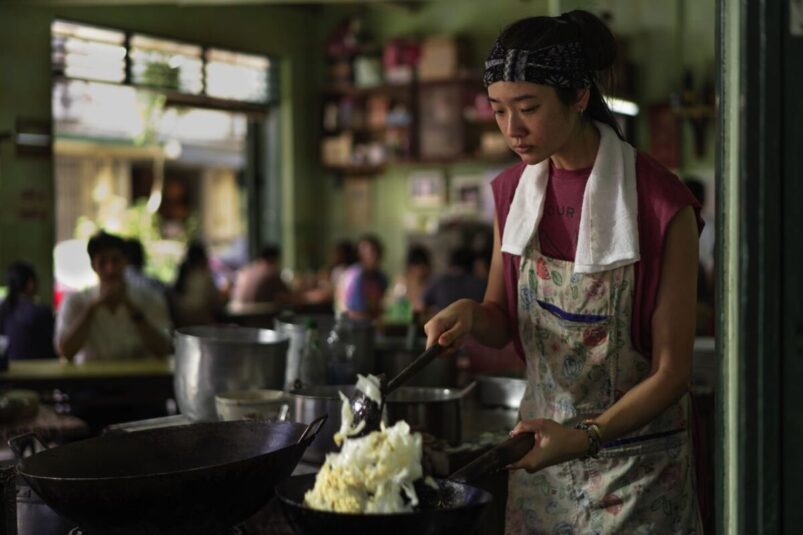Aoy (Chutimon Chuengcharoensukying) works for her father’s noodle joint. It’s a family business, and because she’s the eldest, it’s basically expected that she will take over. As Aoy and her friends gather for lunch, they lament their position in the rat race, doomed to forever grind with nothing to show for it.
Things change for Aoy when she’s offered to come and audition for a place in Hunger, a restaurant helmed by Chef Paul (Nopachai Chaiyanam). He cooks for the rich, preparing incredible tasting food with the most delectable ingredients. Aoy possesses enough hunger to pass the test he sets for her, and becomes part of his kitchen brigade.
Aoy’s relationship with Chef Paul starts out more antagonistic — he’s quick to put her down and make sure she toes the line on the pecking order — but as they continue to work together, Aoy finds herself seeking his approval and validation. She wants to be special like him. The only food Chef Paul properly eats is food made by Aoy. He never compliments or says anything about the quality of her food, but we know that if he’s actually taken a bite and isn’t throwing a tantrum, then it has to be good.
According to Chef Paul, nothing reflects the class divide more than food. For the poor and working class, a simple meal of fried noodles is able to satiate. But for the rich, because they can have anything they want, they are plagued by a constant hunger. Tasty food isn’t good enough for them – it has to be prepared by someone they perceive to be the best. There is a distinct visual difference in the way the different classes eat. With Aoy and her family, it’s always laughs and camaraderie, and for the wealthy, it’s a voracious gorging that disturbs and discomforts.
Chef Paul demands perfection from his staff, and they are subject to his tyrannical ways, yet they serve him faithfully. Why? Working in his kitchen in proximity to him means something. His culinary skills are renowned and desired all over the country, and the rich pay him exorbitant amounts to satiate their never-ending hunger. Aoy herself becomes greedily immersed in that world, obsessed with cooking food that the rich would applaud.
The problem is, when you’re at the top of your game, you’ll do anything to stay there. Chef Paul constantly wants to push the envelope, chasing more exotic and forbidden flavours. It’s also lonely at the top, and the film often gives us long, lingering shots of these characters standing alone in empty spaces. This loneliness is the cost of success. Striving for perfection involves long, hard days away from your family, as well as the brewing resentment that emerges when your partner isn’t quite on par with you.
Usually in these type of movies, with a novice who learns and aspires, and a morally dubious mentor in tow, at some point the novice would do something out of character in order to appease the mentor, or to gain more success. Consider Andy in The Devil Wears Prada, she takes Emily’s spot in Paris and tries to convince herself that she did nothing wrong. What I like about Hunger is that Aoy stays true to who she is throughout the movie. She’s hungry to prove herself, but this isn’t at the cost of her morals.
Hunger wants us to evaluate our perspective on success, and whether that hunger for more is actually good for us. Maybe life is more meaningful and enjoyable when we simply eat to live.
READ NEXT: Bicycle Thieves (1948) | Movies To See Before You Die
Some of the coverage you find on Cultured Vultures contains affiliate links, which provide us with small commissions based on purchases made from visiting our site.


